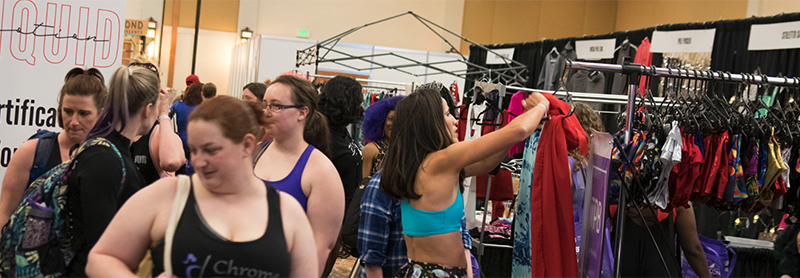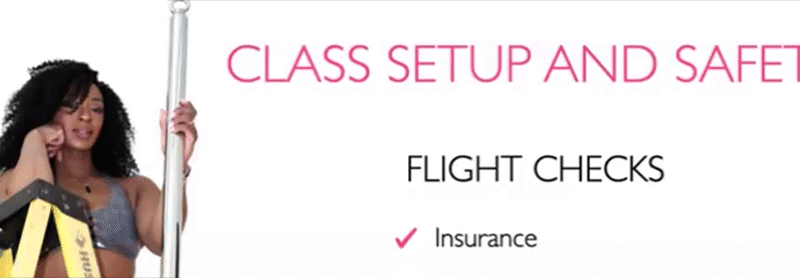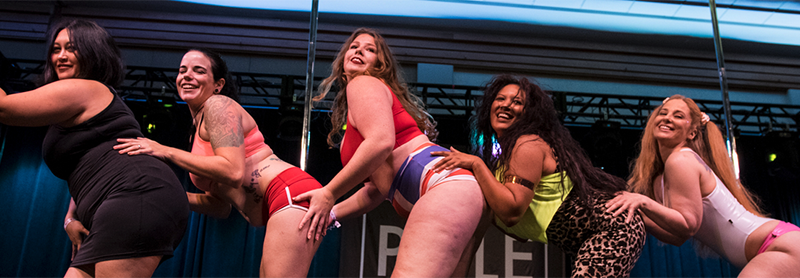A train-cation is a trip (usually away from home) where you focus for a specific…

How to Talk to the Media as a Pole Dancer and Not Slut-Shame Strippers
Whether you are officially talking to the media in some capacity for your business or studio, or even just talking to friends about your new passion, it’s easy to get sucked into the stripper/poler discussion and inadvertently slut shame strippers especially when dealing with an under-educated public. This post addresses how not to do that while still informing and educating the media and the public about our industry.
Start with some facts
Before we go any further, here are a few presumptions to start from:
- Recognize if you personally have experience as a stripper/sex worker or if you do not and frame your response from a place a clear truth without negative commentary.
- Pole (pole dancing, pole fitness, poling, pole sport) has salacious connotations particularly in the American, Puritanical-based culture that are not present to the same degree in other forms of dance, fitness, competitive sports, hobbies, or careers. While that may be changing and certainly has regional eccentricities, pole is not as neutral nor as ubiquitous in the public mind an activity as, say, golf.
- Our history is constantly debated – without and within. For the purposes of how to talk to the media, the form of pole most commonly taught in studios in the United States came from strip clubs and that is a fact most media outlets also hold as a foundational belief. Are there other amazing styles of dance, acrobatics, fitness, etc. that have absolutely influenced the style of modern pole and also have become specific niches that some polers exclusively practice? Yes, of course. But what is the first thing someone uninitiated into our community thinks of when they hear the term “pole dancing”? Strippers.
- Strippers and polers as two unique communities with a tremendous amount of overlap as well as separate and unique challenges.
Sound bites are king in our world
Sound bites are king in our world – more so now then ever before. Explaining the intricacies of how you love pole in a way that stays true to your unique understanding of the sport/passion/hobby/career is gonna take more than 144 characters. The media likes to distill facts into headlines. Complicated stories get mere seconds of airtime. Pole dancers to the media will in some way always be associated with sex.
If you are not a stripper, there is a tendency not just to clarify you aren’t a stripper much in the same way someone would clarify they are not any other sort of career like a plumber or a lawyer when asked. That tendency often goes beyond simple clarification into vehement denial because strippers and sex workers are often both exalted and vilified in American culture. There is a double standard in the US and many other places that creates invisible lines of control around how a cis-gendered woman can experience and express her sexuality versus a cis-gendered man. Men and women may participate in the policing of this control using a methodology known as “slut-shaming,” “a form of social stigma applied to people, especially women and girls, who are perceived to violate traditional expectations for sexual behaviors. Some examples of circumstances wherein women are slut-shamed include violating dress code policies by dressing in perceived sexually provocative ways, requesting access to birth control,[1][2][3] having premarital, casual, or promiscuous sex, engaging in prostitution,[4][5] or when being victim blamed for being raped or otherwise sexually assaulted.[6][7] “
If you are a poler, a stripper is your sibling. Like you, strippers enjoy the same metal apparatus. They may use it in different ways, with different motivations, and possibly with different outcomes but nonetheless, they pole just like you. Would you put your family member down to a stranger? You might use that as an opportunity to educate or explain how you and your sibling are different and both valued for your uniqueness or simply ignore the question if it’s clear it was meant in malice and move on.
Specific questions from the media and how to answer them
When asked by the media directly questions like “is that a convention (business/activity/hobby/etc.) for strippers?”
Answer: “Yes, our community contains strippers and sex workers.”
You should be truthful and say: YES! — “Yes, in fact, we do have plenty of folks who make their living or supplement their living in the club who come to our event.” Once you have specifically addressed this issue head on, you take the power away from the person asking and the potential secret becomes less powerful because it is no longer a secret.
Remember Bill Clinton? When it came out that he had smoked pot in college there was an absurd media campaign on how he had smoked but “didn’t inhale.” The media spent an inordinate amount of time on this silly issue not because of the issue itself but because of how he handled it. When Barack Obama was running for President he had already published a book that clearly said he had smoked pot in college. In this way he controlled his own narrative and it wasn’t some secret issue that had to be ferreted out and then either denied or “managed.”
Do we have strippers in our community? Yes, of course we do! Perhaps your studio caters to a specific clientele and it’s important in your sales and marketing to identify that, try this answer to the same question: “Oh sure, we have strippers in class. We’ve found that the majority of our customers are actually stay-at-home moms looking for a sassy fitness routine and some ‘me time’ away from their families.”
Or to challenge the relevance of the question and re-frame the discussion without slut shaming: “I typically don’t actually ask our students what their jobs are, our studio is a sanctuary away from the pressures of their work where they can have fun and make friends – something that can be really hard as an adult.”
“Are you a stripper?!?!”
When asked by the media or others if you are a stripper and if you are in fact, not a stripper, calmly tell them you are not and move on to the next question. Don’t get flustered, don’t get exasperated, don’t scream that you are not.
Make this a non-issue and take the power away from the asker while not inadvertently by your denial infer there is anything “wrong” with being a stripper.
The devil is in the details in terms of intent, audience, end goal, and situation with regards to pole – it’s not the apparatus. Make the media and anyone else you’re talking to think behind the sound bite to real people and real experiences. Perhaps ask them back why that is a relevant question? The answer will speak volumes about them and not about you.
Inclusion is your friend
Do not in any way set up a dichotomy of “us vs. them” – for a media interview, a cute tshirt, or a catchy hashtag. Pole dancers and strippers (current, former, retired and everything in between) teach people of all genders to be sweaty fitness freaks some days, sex kittens the next, contemporary dancers on Sundays, acrobats on Thursdays, goofballs on Saturday afternoons. Pole teachers teach self-care and self-love and expression and finding joy in small successes both inside and outside of the studio.
When we talk to the media, we want them to know that. We want them to know the confidence that comes from allowing your body to move and express things that are too hard to put into words.We want them to appreciate that everyone is not only welcome in our community but also celebrated—not in spite of our differences, but because of them. And we really want them to know that we will not participate in any slut-shaming because it suits the sound bite.
Moving forward
For pole dancers who aren’t strippers in our rush to share our love of pole with not-yet-polers, we can sometimes misstep.
Review your marketing and public relations materials, look at how you have spoken about pole in the past and consider how you might make small changes to educate and inform while also being clear that everyone – yes, everyone – is welcome into our sport/passion/hobby/career. Pole will continue never being just one thing for one specific group and other communities will also come to share and appreciate our apparatus. But, we can only get there together.



